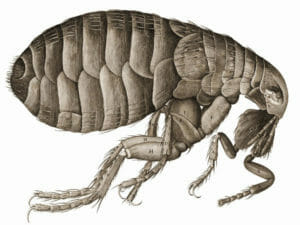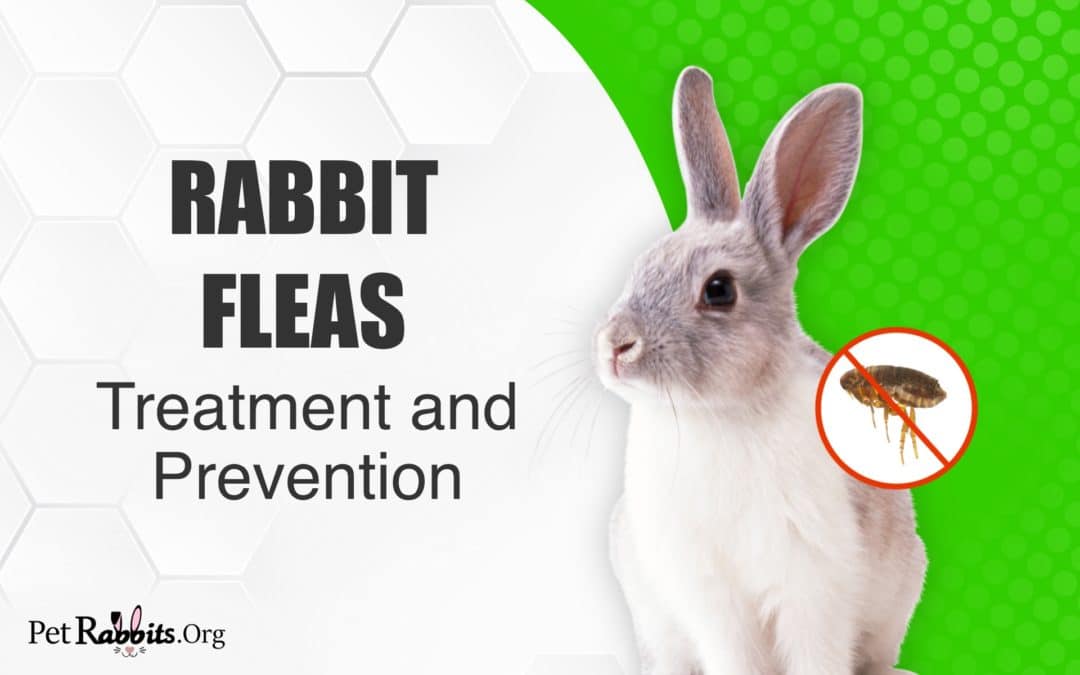How did my rabbit get fleas?

Your rabbit may have contracted fleas from a variety of sources, including other pets in the home. Fleas may be transferred directly from animal to animal if your rabbit comes into contact with other pets, including other infected rabbits. These insects may also be transferred from infected pets to carpets, rugs, bedding, or other fabrics inside the home. Once there, fleas can survive for up to 100 days on your soft surfaces before infesting animals that come into contact with those surfaces. Pet rabbits may also become infected if allowed to play or graze outdoors in untreated grass where these bugs reside. Once infected, your rabbit must be treated in order to rid your pet of these pests, as fleas will not go away on their own.
What Flea Treatments are Rabbit-Safe?
Flea Combs: Although not completely effective in ridding your furry friend of fleas, flea combs can be used as the first line of defense against an invasion. Combs can be used to remove fleas from the legs and ears of your rabbit, or on any part of the rabbit where the hair is sparse or the fleas are easily visible. Unfortunately, flea combs are ineffective for removing large quantities of fleas, or in very long or dense hair. Once combed out, fleas should be drowned in soapy water or alcohol. Make sure the brush is completely clear of fleas between each combing.
Please use caution using any flea powders or topical treatments. We advise using natural treatments like apple cider vinegar before any other method. Consult your veterinarian prior to using any of these methods.
Flea Powder: Flea powder can be used in combination with a comb to provide effective flea treatment for rabbits, although owners should exercise caution when choosing the correct power. Rabbits can be dusted with powders containing 5% carbaryl insecticide to kill fleas, larvae, and eggs. However, natural powders should be avoided, as they may contain peppermint, eucalyptus, pennyroyal, or other herbs, all of which are poisonous to rabbits.
To use this treatment, sprinkle the powder over the rabbit and work through the fur to the skin. Some owners may be concerned about the possible ingestion of flea powders by their pets; however, the presence of active ingredients within these powders is limited, as much of the powder itself is a carrier agent. As long as rabbits do not consume an excess of this powder, it should not pose a threat to their health.
Topical Flea Treatments: Topical medications can also be effective flea treatments for rabbits. These treatments are liquid or gel medications applied between the rabbit’s
shoulder blades. Safe flea medicine for rabbits includes Advantage, Revolution, Program, and Stronghold, although owners should consult with their veterinarian before treatment to insure proper dosing. When treating two or more rabbits with this method, it is necessary to keep the rabbits separated to prevent the ingestion of the medication by licking
Apple Cider Vinegar: Using 1 part vinegar and 1 part water the rabbit can be sprayed with the mixture and rubbed into their fur to get rid of flea infestation. As a preventative measure, you can add about 1 Tablespoon of apple cider vinegar per 1 Gallon of water to your rabbit’s daily water supply. In addition, apple cider vinegar has numerous health benefits for your rabbit. Warning: If your rabbits stop drinking their water when adding apple cider vinegar to it, stop using it. Your bunnies must stay hydrated so monitor this carefully.
What Rabbit Flea Treatments Should be Avoided?
Flea Collars: Although flea collars are often effective at controlling fleas on dogs or cats, these collars should never be used on rabbits. The medication coating these collars are offered in dosages far higher than is safe for small, lightweight animals like rabbits. Additionally, rabbits dislike being restrained by collars, and will most likely not allow for the collar to remain on long-term.
Flea Baths or Dips: While some pet grooming services or veterinary offices may offer dips or baths to combat rabbit fleas, these treatments are not recommended by rabbit experts. Unfortunately, both the ingredients of the dip and the stress of the bath itself could potentially be fatal, so this method should be avoided.
Topical Medications Frontline or Sentinel: Unlike flea treatments deemed safe, Sentinel and Frontline are not safe flea medicine for rabbits. These medications have been shown to cause a variety of adverse reactions in rabbits, including seizures and death, and should never be used in the treatment of fleas.
Prevention is key!
Because fleas can prove difficult to eradicate once an infestation has taken hold, the best way to treat rabbit fleas is to prevent them from occurring in the first place. Regular vacuuming and steam cleaning can substantially reduce the occurrence of fleas within your home. Additionally, insect sprays, flea bombs, or boric-acid carpet treatments may be employed to keep your home flea free. Just remember, always keep rabbits, and all other pets, away from treated carpets or rooms for twenty-four hours after treatment.
Overall, rabbit fleas are an irritating but treatable pest. A variety of methods are available to concerned pet owners looking to rid their rabbits of these pesky insects, but some treatments should be avoided. To keep your pet safe, remember to carefully review all ingredients and speak with your veterinarian before treating your furry friend for fleas.
Have your rabbits ever had fleas? Do you have any experience with treating them? What has worked for you? Please let us know by leaving a comment below.
I have always loved rabbits. A rabbit was my very first pet. Since owning my first rabbit I have gone on to own many more. I look forward to being able to get my kids their very own pet rabbits.



my son just bought a bunny and it has fleas. I was wondering if it is ok to use diatomaceous earth to get rid of the fleas
Yes, you can use that to treat their fleas. Make sure you look up how to do it to make sure and not put the rabbit through more trama.
Thank You.
My rabbit has been fleaed I didn’t know you had to keep it separate from the dogs as they have fleaed too I’m hoping my rabbit is okay he isn’t his usual self
If you would like to speak to one of our vets and get a treatment plan together, go ahead and make an appointment here https://www.petrabbits.org/veterinary-video-call/
Thank you for your comment.
Hi. I recently acquired 4 bunnies from a neighbor that threw them out. Thankfully, one was adopted. The person that adopted the bunny took hers to the vet and they are about 3 months old. Is the apple cider vinegar treatment safe for them? One of the bunnies that i caught last must have gotten fleas and gave them to the others…Also, are they young enough to start getting them used to baths so that I can try the dawn dish soap bath idea as well? Please help!! I am very new to this and dont want to hurt them!
I would not recommend giving them a bath as this can cause the rabbit a lot of stress and they could suffer a heart attack. You could try a wash cloth with ACV or dawn dish soap on it to try and get the fleas off them without causing the rabbit too much stress.
Thank you for your comment.
Hi I was wondering if you have or can do a study on how ACV is good for rabbits I haven’t found and reliable information on it other than you 🙂 and I would love to learn more about it and what is true and what’s not true for the benefits ty
Thank you for the idea, we will look into this.
Thank you for your comment.
hello i adopted a little baby bunny a few ive had it for a few weeks then it got fleas from inside of my house the keep growin numerous of them its a baby dwarf bunny
Hi there, I have acquired two rabbits from a neighbor who literally threw these pet rabbits out because she decided that she didn’t want to care for them anymore. She said she had them for years but I doubt it because now I’ve discovered that one is male and the other is female. They have given life to 8 bunnies. So now I have 10. They are all outside in an outdoor pen. I have a couple of questions. I am new to the whole bunny thing. I love them dearly. I am a forever bunny mom not but I am not sure how to treat for fleas, which I just discovered they have. I don’t have a bunch of money but I do need to treat them. How can I go about doing this? Also, what are must haves for outdoor bunnies? I have an enclosed shelter, but it’s mainly dirt and no grass. I’ve been giving them alfalfa hay because I read that this is what baby bunnies need. I have been feeding them yoiung rabbit food of course. They are now about months old. What else do I need to make sure to provide for these crazy bunnies? Thanks for the help!
Hello! You have taken on a lot with these bunnies. We wish you look here at Pet Rabbits. please browse through our content to find some helpful articles, I have provided a few that could be helpful below:
https://www.petrabbits.org/best-hay-for-rabbits/
https://www.petrabbits.org/best-rabbit-hutches/
https://www.petrabbits.org/category/pet-rabbits-101/rabbit-care/
i find your advice helpful i will try apple cider vinegar to spray. i have 10 bunnies which were doing very well and the fleas came from a near by indigenous chicken run which i also discovered had fleas
I do not recommend adding anything to their drinking water , if they don’t like it and dont drink it therefore becoming dehydrated and die.
Yes that’s very true. Be very careful about your bunnies not drinking water. Thank you for the comments. I’ll update the article to reflect that concern!
I have read washing domestic bunnies in Dawn is very helpful for fleas and mites. I am going to try the Apple cider vinegar/water spray. I have a 13 yr old bunny and younger mate. My old one can’t jump in the litter box anymore and has lost some of his back leg movement
I think is due to old age
Rabbits can’t be given baths. They could die from the stress.
Dear Rachel, I give my rabbit baths and even take him in the shower with me, lather him up and spray to rinse, then cover him with a big bath towel to absorb and rub him to dry. In the winter months I even blow dry him with hair dryer.
I believe the key is gentleness, soft language, a lot of hugs and kisses.
(Bathing info not flea)
Rabbits CANNOT regulate their body temperatures if bathed. It doesn’t matter how gentle or trusted you are with your bunny. Yes, stress and shock death could happen too. Do you really want to risk this even one time? A damp cloth is fine but not soaked/submerged. You might get lucky but don’t risk this. Rabbits are very clean. They don’t need baths regardless. Maybe spot treatment on occasion or if disabled or lazy.